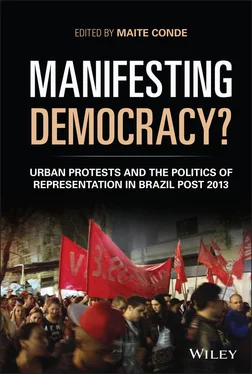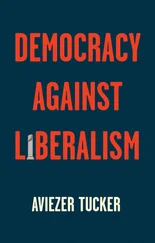Manifesting Democracy?
Здесь есть возможность читать онлайн «Manifesting Democracy?» — ознакомительный отрывок электронной книги совершенно бесплатно, а после прочтения отрывка купить полную версию. В некоторых случаях можно слушать аудио, скачать через торрент в формате fb2 и присутствует краткое содержание. Жанр: unrecognised, на английском языке. Описание произведения, (предисловие) а так же отзывы посетителей доступны на портале библиотеки ЛибКат.
- Название:Manifesting Democracy?
- Автор:
- Жанр:
- Год:неизвестен
- ISBN:нет данных
- Рейтинг книги:3 / 5. Голосов: 1
-
Избранное:Добавить в избранное
- Отзывы:
-
Ваша оценка:
- 60
- 1
- 2
- 3
- 4
- 5
Manifesting Democracy?: краткое содержание, описание и аннотация
Предлагаем к чтению аннотацию, описание, краткое содержание или предисловие (зависит от того, что написал сам автор книги «Manifesting Democracy?»). Если вы не нашли необходимую информацию о книге — напишите в комментариях, мы постараемся отыскать её.
—Dr Jeff Garmany, University of Melbourne Manifesting Democracy?
Manifesting Democracy? — читать онлайн ознакомительный отрывок
Ниже представлен текст книги, разбитый по страницам. Система сохранения места последней прочитанной страницы, позволяет с удобством читать онлайн бесплатно книгу «Manifesting Democracy?», без необходимости каждый раз заново искать на чём Вы остановились. Поставьте закладку, и сможете в любой момент перейти на страницу, на которой закончили чтение.
Интервал:
Закладка:
Series Editors’ Preface
The Antipode Book Series publishes books which engage and strengthen radical geographical ideas and Left politics broadly defined by combining critical theoretical interventions and empirical rigour. While we are open to different forms of substantive, innovative, and imaginative scholarship, we are particularly keen to publish monographs that develop their argument in sustained and situated ways. While the series is rooted in geography and transnational in scope, it is neither limited to disciplinary scholarship nor does it privilege particular geographical contexts. Rather, we are interested in a broad spectrum of politically engaged scholarship that is in conversation with critical debates across fields, and that might speak to issues posed by contemporary political conjunctures. We particularly welcome submissions from authors from the global South and from backgrounds traditionally under-represented in the academy.
If you have an idea for an Antipode book, whether it is a monograph or an edited collection, please contact the Book Series Editors who are happy to discuss ideas for potential book proposals. For more details about the series, see: https://antipodeonline.org/category/antipode-book-series
Kiran Asher
University of Massachusetts, USA
David Featherstone
University of Glasgow, UK
Antipode Book Series Editors
Vinay Gidwani
University of Minnesota, USA
Sharad Chari
University of California, Berkeley, USA
Antipode Book Series Editors (2012–2020)
Acknowledgements
This book has been many years in production. It began life as an article on the protests that took place in Brazil in June 2013, called ‘Kicking off in Brazil: Manifesting Democracy’, co-authored with Tariq Jazeel, which was published in the Journal of Latin American Cultural Studies in 2013. I am grateful to Jens Andermann and the editors of that journal for their interest in the article. Thanks also to Tariq for his original input to this project.
I am extremely pleased to be part of Wiley’s Antipode Book series. I am grateful to the editors of the series for their support of this project and their patience is seeing it to fruition. Special thanks to Dave Featherstone for his enthusiasm and help with the book. I am also grateful to have received funding from Antipode to translate many of the chapters here from Portuguese. Many thanks to Lisa Shaw for her excellent translations. At Wiley, Jacqueline Scott has been endlessly helpful, guiding the book through its various stages with patience and dedication throughout.
The collection has benefitted greatly from the comments and suggestions provided by the two anonymous reviewers, as well as to Bryan Cameron, Ulrich Oslender, and David Treece who provided feedback on the introduction at various stages. Thanks also to Stephanie Dennison who suggested I present aspects of the introduction at a seminar at Leeds University and to those in the audience for the lively discussion that followed.
Chapter 6 of this book was previously published in the journal Latin American Perspectives and an earlier version of Chapter 9was published in Studies in Political Economy . Many thanks to the editors of these journals for allowing these chapters to appear here.
I owe my greatest thanks to the scholars and activists who contributed chapters to this edited collection, both for their work and their patience in seeing the project through. Hailing from different fields, backgrounds, and generations they shed light on an important event in Brazil’s recent history, challenging us to think about the country’s political foundations and framework.
This book is dedicated to them. It is also dedicated to all of those who participated in the original manifestações in Brazil in June 2013 and their hope in seeing a better Brazil.
Maite Conde
Cambridge
1 Introduction
Maite Conde
Grappling with the question of democracy in Brazil is far from straightforward, not least in the country’s contemporary history. In 2016, then President Dilma Rousseff, of the PT ( Partido dos Trabalhadores ) or the Workers’ Party, was impeached and evicted from office midway through her second term after being found guilty of breaking budgetary laws for deferring payments on public accounts, a long-standing practice common to previous governments. Two years later, her predecessor, Luís Inácio Lula da Silva, the most popular ruler in Brazilian history, was incarcerated for 12 years, an act carried out ostensibly on grounds of corruption and money laundering, yet one that as recent reporting has uncovered was part of a conspiracy to prevent him and the Workers’ Party from returning to power in the 2018 election. 1 With Lula out of the way, that election was won by the right-wing candidate Jair Messias Bolsonaro, a former military officer who has extolled the country’s most notorious torturer; declared that the military dictatorship should have shot thirty thousand opponents; told a congress woman that she was too ugly to merit raping; announced he would rather his son be killed in a car accident than be gay; avowed open season on the Amazon rainforest, pledging to take land away from indigenous communities; declared that indigenous and Afro-Brazilian peoples are not fit for anything, not even procreating; and promised to rid Brazil of red riff-raff.
In 1991 Brazilian philosopher Marilena Chaui, a contributor to this volume, declared ‘Brazil is an authoritarian country,’ since it has yet to ‘fully realise the principals of liberalism and republicanism’ (2011, p. 169) Brazil is a nation, Chaui stated ‘where there is no distinction between public and private, in which there is an inability to tolerate the formal and abstract principle of equality before the law, in which social and popular forms of struggle are repressed and in which racial, sexual and class discrimination are pervasive’ (2011, p. 170). Chaui’s words seem especially prescient today. Since taking office in January 2019, Bolsonaro’s right-wing government has intimidated and arrested journalists investigating possible illegalities in his cabinet, accusing them of criminal activities and of spreading fake news; it has appointed Bolsonaro’s own son, Eduardo, Brazil’s ambassador to Washington DC, in spite of his lack of political experience, and hired another son Carlos, as head of communications; it has slashed funding for social initiatives, including science- and public-education programmes, that enabled poorer and Afro-Brazilian students to enter university; and it has made severe cuts to FUNAI, the National Indian Foundation, curtailing the rights of indigenous people, a move that has precipitated increased deforestation, as well as land invasions by loggers and miners and led to a rise in homicides. Bolsonaro himself has called for security forces and citizens who shoot alleged offenders to be shielded from prosecution, stating that he hopes that criminals will ‘die in the streets like cockroaches.’ At the time of writing, with the country suffering from the effects of the Covid-19 pandemic, experiencing one of the highest mortality rates in the world, Bolsonaro has dismissed the disease as nothing more than ‘a little flu;’ 2 has rejected media ‘hysteria’ over its dangers; and sacked his health minister, Luiz Henrique Mandetta, after he publicly challenged the president’s behaviour.
More than mere words, Bolsonaro’s fondness for authoritarianism shapes his actions, policies, and his very government. He has filled his government with more than 100 serving and retired military officers, including several of his own cabinet ministers, forcing many commentators to fear for the country’s democracy. Celso de Mello, Brazil’s longest serving judge of the supreme court, for example, has stated that the nation now resembles Weimar Germany with its president bent on destroying democracy and replacing it with ‘abject dictatorship.’ 3 And for Oscar Vilhena Vieira, dean of the Law School at the Fundação Getúlio Vargas , ‘Brazilian democracy is under serious threat. The president is not just trying to create institutional conflicts, (but also) trying to stimulate violent groups.’ 4 Such fears are compounded by Bolsonaro’s frequent and enthusiastic attendance at rallies, at which demonstrators, often wearing paramilitary uniforms, call for Congress and the Supreme Court to be shut down and replaced with military rule.
Читать дальшеИнтервал:
Закладка:
Похожие книги на «Manifesting Democracy?»
Представляем Вашему вниманию похожие книги на «Manifesting Democracy?» списком для выбора. Мы отобрали схожую по названию и смыслу литературу в надежде предоставить читателям больше вариантов отыскать новые, интересные, ещё непрочитанные произведения.
Обсуждение, отзывы о книге «Manifesting Democracy?» и просто собственные мнения читателей. Оставьте ваши комментарии, напишите, что Вы думаете о произведении, его смысле или главных героях. Укажите что конкретно понравилось, а что нет, и почему Вы так считаете.












